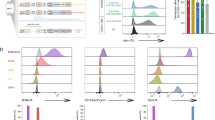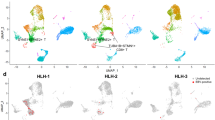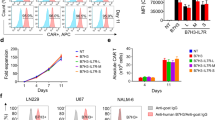Abstract
Tumor-derived exosomes (TEXs) enriched in immune suppressive molecules predominantly drive T-cell dysfunction and impair antitumor immunity. Chimeric antigen receptor (CAR) T-cell therapy has emerged as a promising treatment for refractory and relapsed hematological malignancies, but whether lymphoma TEXs have the same impact on CAR T-cell remains unclear. Here, we demonstrated that B-cell lymphoma-derived exosomes induce the initial activation of CD19-CAR T-cells upon stimulation with exosomal CD19. However, lymphoma TEXs might subsequently induce CAR T-cell apoptosis and impair the tumor cytotoxicity of the cells because of the upregulated expression of the inhibitory receptors PD-1, TIM3, and LAG3 upon prolonged exposure. Similar results were observed in the CAR T-cells exposed to plasma exosomes from patients with lymphoma. More importantly, single-cell RNA sequencing revealed that CAR T-cells typically showed differentiated phenotypes and regulatory T-cell (Treg) phenotype conversion. By blocking transforming growth factor β (TGF-β)-Smad3 signaling with TGF-β inhibitor LY2109761, the negative effects of TEXs on Treg conversion, terminal differentiation, and immune checkpoint expression were rescued. Collectively, although TEXs lead to the initial activation of CAR T-cells, the effect of TEXs suppressed CAR T-cells, which can be rescued by LY2109761. A treatment regimen combining CAR T-cell therapy and TGF-β inhibitors might be a novel therapeutic strategy for refractory and relapsed B-cell lymphoma.
Similar content being viewed by others
References
Chong EA, Ruella M, Schuster SJ; Lymphoma Program Investigators at the University of Pennsylvania. Five-year outcomes for refractory b-cell lymphomas with car t-cell therapy. N Engl J Med 2021; 384(7): 673–674
Kochenderfer JN, Dudley ME, Kassim SH, Somerville RP, Carpenter RO, Stetler-Stevenson M, Yang JC, Phan GQ, Hughes MS, Sherry RM, Raffeld M, Feldman S, Lu L, Li YF, Ngo LT, Goy A, Feldman T, Spaner DE, Wang ML, Chen CC, Kranick SM, Nath A, Nathan DA, Morton KE, Toomey MA, Rosenberg SA. Chemotherapy-refractory diffuse large B-cell lymphoma and indolent B-cell malignancies can be effectively treated with autologous T cells expressing an anti-CD19 chimeric antigen receptor. J Clin Oncol 2015; 33(6): 540–549
Orlando EJ, Han X, Tribouley C, Wood PA, Leary RJ, Riester M, Levine JE, Qayed M, Grupp SA, Boyer M, De Moerloose B, Nemecek ER, Bittencourt H, Hiramatsu H, Buechner J, Davies SM, Verneris MR, Nguyen K, Brogdon JL, Bitter H, Morrissey M, Pierog P, Pantano S, Engelman JA, Winckler W. Genetic mechanisms of target antigen loss in CAR19 therapy of acute lymphoblastic leukemia. Nat Med 2018; 24(10): 1504–1506
Sotillo E, Barrett DM, Black KL, Bagashev A, Oldridge D, Wu G, Sussman R, Lanauze C, Ruella M, Gazzara MR, Martinez NM, Harrington CT, Chung EY, Perazzelli J, Hofmann TJ, Maude SL, Raman P, Barrera A, Gill S, Lacey SF, Melenhorst JJ, Allman D, Jacoby E, Fry T, Mackall C, Barash Y, Lynch KW, Maris JM, Grupp SA, Thomas-Tikhonenko A. Convergence of acquired mutations and alternative splicing of cd19 enables resistance to cart-19 immunotherapy. Cancer Discov 2015; 5(12): 1282–1295
Tong C, Zhang Y, Liu Y, Ji X, Zhang W, Guo Y, Han X, Ti D, Dai H, Wang C, Yang Q, Liu W, Wang Y, Wu Z, Han W. Optimized tandem CD19/CD20 CAR-engineered T cells in refractory/relapsed B-cell lymphoma. Blood 2020; 136(14): 1632–1644
Deng W, Chen P, Lei W, Xu Y, Xu N, Pu JJ, Liang A, Qian W. CD70-targeting CAR-T cells have potential activity against CD19-negative B-cell Lymphoma. Cancer Commun (Lond) 2021; 41(9): 925–929
Spiegel JY, Patel S, Muffly L, Hossain NM, Oak J, Baird JH, Frank MJ, Shiraz P, Sahaf B, Craig J, Iglesias M, Younes S, Natkunam Y, Ozawa MG, Yang E, Tamaresis J, Chinnasamy H, Ehlinger Z, Reynolds W, Lynn R, Rotiroti MC, Gkitsas N, Arai S, Johnston L, Lowsky R, Majzner RG, Meyer E, Negrin RS, Rezvani AR, Sidana S, Shizuru J, Weng WK, Mullins C, Jacob A, Kirsch I, Bazzano M, Zhou J, Mackay S, Bornheimer SJ, Schultz L, Ramakrishna S, Davis KL, Kong KA, Shah NN, Qin H, Fry T, Feldman S, Mackall CL, Miklos DB. CAR T cells with dual targeting of CD19 and CD22 in adult patients with recurrent or refractory B cell malignancies: a phase 1 trial. Nat Med 2021; 27(8): 1419–1431
Cordoba S, Onuoha S, Thomas S, Pignataro DS, Hough R, Ghorashian S, Vora A, Bonney D, Veys P, Rao K, Lucchini G, Chiesa R, Chu J, Clark L, Fung MM, Smith K, Peticone C, Al-Hajj M, Baldan V, Ferrari M, Srivastava S, Jha R, Arce Vargas F, Duffy K, Day W, Virgo P, Wheeler L, Hancock J, Farzaneh F, Domning S, Zhang Y, Khokhar NZ, Peddareddigari VGR, Wynn R, Pule M, Amrolia PJ. CAR T cells with dual targeting of CD19 and CD22 in pediatric and young adult patients with relapsed or refractory B cell acute lymphoblastic leukemia: a phase 1 trial. Nat Med 2021; 27(10): 1797–1805
Liu H, Lei W, Zhang C, Yang C, Wei J, Guo Q, Guo X, Chen Z, Lu Y, Young KH, Lu Z, Qian W. CD19-specific CAR T cells that express a PD-1/CD28 chimeric switch-receptor are effective in patients with PD-L1-positive B-cell lymphoma. Clin Cancer Res 2021; 27(2): 473–484
Yan X, Chen D, Wang Y, Guo Y, Tong C, Wei J, Zhang Y, Wu Z, Han W. Identification of NOXA as a pivotal regulator of resistance to CAR T-cell therapy in B-cell malignancies. Signal Transduct Target Ther 2022; 7(1): 98
Milane L, Singh A, Mattheolabakis G, Suresh M, Amiji MM. Exosome mediated communication within the tumor microenvironment. J Control Release 2015; 219: 278–294
Mashouri L, Yousefi H, Aref AR, Ahadi AM, Molaei F, Alahari SK. Exosomes: composition, biogenesis, and mechanisms in cancer metastasis and drug resistance. Mol Cancer 2019; 18(1): 75
Whiteside TL. Tumor-derived exosomes and their role in cancer progression. Adv Clin Chem 2016; 74: 103–141
Yang E, Wang X, Gong Z, Yu M, Wu H, Zhang D. Exosome-mediated metabolic reprogramming: the emerging role in tumor microenvironment remodeling and its influence on cancer progression. Signal Transduct Target Ther 2020; 5(1): 242
Ghosh AK, Secreto CR, Knox TR, Ding W, Mukhopadhyay D, Kay NE. Circulating microvesicles in B-cell chronic lymphocytic leukemia can stimulate marrow stromal cells: implications for disease progression. Blood 2010; 115(9): 1755–1764
Ma F, Vayalil J, Lee G, Wang Y, Peng G. Emerging role of tumorderived extracellular vesicles in T cell suppression and dysfunction in the tumor microenvironment. J Immunother Cancer 2021; 9(10): e003217
Szczepanski MJ, Szajnik M, Welsh A, Whiteside TL, Boyiadzis M. Blast-derived microvesicles in sera from patients with acute myeloid leukemia suppress natural killer cell function via membrane-associated transforming growth factor-beta1. Haematologica 2011; 96(9): 1302–1309
Wieckowski EU, Visus C, Szajnik M, Szczepanski MJ, Storkus WJ, Whiteside TL. Tumor-derived microvesicles promote regulatory T cell expansion and induce apoptosis in tumor-reactive activated CD8+ T lymphocytes. J Immunol 2009; 183(6): 3720–3730
Hao Q, Wu Y, Wu Y, Wang P, Vadgama JV. Tumor-derived exosomes in tumor-induced immune suppression. Int J Mol Sci 2022; 23(3): 1461
Chen Z, You L, Wang L, Huang X, Liu H, Wei JY, Zhu L, Qian W. Dual effect of DLBCL-derived EXOs in lymphoma to improve DC vaccine efficacy in vitro while favor tumorgenesis in vivo. J Exp Clin Cancer Res 2018; 37(1): 190
Hao Y, Chen P, Zhang X, Shao Y, Xu Y, Qian W. The effects of tumor-derived exosomes on T-cell function and efficacy of cancer immunotherapy. ImmunoMedicine 2021; 1(2): e1029
Poggio M, Hu T, Pai CC, Chu B, Belair CD, Chang A, Montabana E, Lang UE, Fu Q, Fong L, Blelloch R. Suppression of exosomal PD-L1 induces systemic anti-tumor immunity and memory. Cell 2019; 177(2): 414–427.e13
Stüber T, Monjezi R, Wallstabe L, Kühnemundt J, Nietzer SL, Dandekar G, Wöckel A, Einsele H, Wischhusen J, Hudecek M. Inhibition of TGF-β-receptor signaling augments the antitumor function of ROR1-specific CAR T-cells against triple-negative breast cancer. J Immunother Cancer 2020; 8(1): e000676
Aung T, Chapuy B, Vogel D, Wenzel D, Oppermann M, Lahmann M, Weinhage T, Menck K, Hupfeld T, Koch R, Trümper L, Wulf GG. Exosomal evasion of humoral immunotherapy in aggressive B-cell lymphoma modulated by ATP-binding cassette transporter A3. Proc Natl Acad Sci USA 2011; 108(37): 15336–15341
Aitamer M, Akil H, Vignoles C, Branchaud M, Abraham J, Gachard N, Feuillard J, Jauberteau MO, Shirvani H, Troutaud D, Bentayeb H. CD20 expression, TrkB activation and functional activity of diffuse large B cell lymphoma-derived small extracellular vesicles. Br J Cancer 2021; 125(12): 1687–1698
Cox MJ, Lucien F, Sakemura R, Boysen JC, Kim Y, Horvei P, Manriquez Roman C, Hansen MJ, Tapper EE, Siegler EL, Forsman C, Crotts SB, Schick KJ, Hefazi M, Ruff MW, Can I, Adada M, Bezerra E, Kankeu Fonkoua LA, Nevala WK, Braggio E, Ding W, Parikh SA, Kay NE, Kenderian SS. Leukemic extracellular vesicles induce chimeric antigen receptor T cell dysfunction in chronic lymphocytic leukemia. Mol Ther 2021; 29(4): 1529–1540
Xhangolli I, Dura B, Lee G, Kim D, Xiao Y, Fan R. Single-cell analysis of CAR-T cell activation reveals a mixed TH1/TH2 response independent of differentiation. Genom Proteom Bioinf 2019; 17(2): 129–139
Nakamura K, Kitani A, Strober W. Cell contact-dependent immunosuppression by CD4+CD25+ regulatory T cells is mediated by cell surface-bound transforming growth factor beta. J Exp Med 2001; 194(5): 629–644
Huber S, Schramm C, Lehr HA, Mann A, Schmitt S, Becker C, Protschka M, Galle PR, Neurath MF, Blessing M. TGF-beta signaling is required for the in vivo expansion and immunosuppressive capacity of regulatory CD4+CD25+ T cells. J Immunol 2004; 173(11): 6526–6531
Tang N, Cheng C, Zhang X, Qiao M, Li N, Mu W, Wei XF, Han W, Wang H. TGF-β inhibition via CRISPR promotes the long-term efficacy of CAR T cells against solid tumors. JCI Insight 2020; 5(4): e133977
Chen W, Konkel JE. TGF-beta and ‘adaptive’ Foxp3+ regulatory T cells. J Mol Cell Biol 2010; 2(1): 30–36
Tone Y, Furuuchi K, Kojima Y, Tykocinski ML, Greene MI, Tone M. Smad3 and NFAT cooperate to induce Foxp3 expression through its enhancer. Nat Immunol 2008; 9(2): 194–202
Park BV, Freeman ZT, Ghasemzadeh A, Chattergoon MA, Rutebemberwa A, Steigner J, Winter ME, Huynh TV, Sebald SM, Lee SJ, Pan F, Pardoll DM, Cox AL. TGFβ1-mediated smad3 enhances pd-1 expression on antigen-specific t cells in cancer. Cancer Discov 2016; 6(12): 1366–1381
Oksvold MP, Kullmann A, Forfang L, Kierulf B, Li M, Brech A, Vlassov AV, Smeland EB, Neurauter A, Pedersen KW. Expression of B-cell surface antigens in subpopulations of exosomes released from B-cell lymphoma cells. Clin Ther 2014; 36(6): 847–862.e1
Ali S, Toews K, Schwiebert S, Klaus A, Winkler A, Grunewald L, Oevermann L, Deubzer HE, Tuns A, Jensen MC, Henssen AG, Eggert A, Schulte JH, Schwich E, Rebmann V, Schramm A, Kunkele A. Tumor-derived extracellular vesicles impair cd171-specific cd4+ car t cell efficacy. Front Immunol 2020; 11: 531
Lin SC, Haga K, Zeng XL, Estes MK. Generation of CRISPR-Cas9-mediated genetic knockout human intestinal tissue-derived enteroid lines by lentivirus transduction and single-cell cloning. Nat Protoc 2022; 17(4): 1004–1027
Tantalo DG, Oliver AJ, von Scheidt B, Harrison AJ, Mueller SN, Kershaw MH, Slaney CY. Understanding T cell phenotype for the design of effective chimeric antigen receptor T cell therapies. J Immunother Cancer 2021; 9(5): e002555
Fraietta JA, Lacey SF, Orlando EJ, Pruteanu-Malinici I, Gohil M, Lundh S, Boesteanu AC, Wang Y, O’Connor RS, Hwang WT, Pequignot E, Ambrose DE, Zhang C, Wilcox N, Bedoya F, Dorfmeier C, Chen F, Tian L, Parakandi H, Gupta M, Young RM, Johnson FB, Kulikovskaya I, Liu L, Xu J, Kassim SH, Davis MM, Levine BL, Frey NV, Siegel DL, Huang AC, Wherry EJ, Bitter H, Brogdon JL, Porter DL, June CH, Melenhorst JJ. Determinants of response and resistance to CD19 chimeric antigen receptor (CAR) T cell therapy of chronic lymphocytic leukemia. Nat Med 2018; 24(5): 563–571
Chen GM, Chen C, Das RK, Gao P, Chen CH, Bandyopadhyay S, Ding YY, Uzun Y, Yu W, Zhu Q, Myers RM, Grupp SA, Barrett DM, Tan K. Integrative bulk and single-cell profiling of premanufacture t-cell populations reveals factors mediating longterm persistence of CAR T-cell therapy. Cancer Discov 2021; 11(9): 2186–2199
Yang C, Kim SH, Bianco NR, Robbins PD. Tumor-derived exosomes confer antigen-specific immunosuppression in a murine delayed-type hypersensitivity model. PLoS One 2011; 6(8): e22517
Kloss CC, Lee J, Zhang A, Chen F, Melenhorst JJ, Lacey SF, Maus MV, Fraietta JA, Zhao Y, June CH. Dominant-negative tgf-β receptor enhances psma-targeted human car t cell proliferation and augments prostate cancer eradication. Mol Ther 2018; 26(7): 1855–1866
Chen X, Yang S, Li S, Qu Y, Wang HY, Liu J, Dunn ZS, Cinay GE, MacMullan MA, Hu F, Zhang X, Wang P. Secretion of bispecific protein of anti-PD-1 fused with TGF-β trap enhances antitumor efficacy of CAR-T cell therapy. Mol Ther Oncolytics 2021; 21: 144–157
Proff J, Brey CU, Ensser A, Holter W, Lehner M. Turning the tables on cytomegalovirus: targeting viral Fc receptors by CARs containing mutated CH2-CH3 IgG spacer domains. J Transl Med 2018; 16(1): 26
Boyiadzis M, Whiteside TL. Plasma-derived exosomes in acute myeloid leukemia for detection of minimal residual disease: are we ready? Expert Rev Mol Diagn 2016; 16(6): 623–629
Acknowledgements
This work was supported by the funds from the National Natural Science Foundation of China (Nos. 81830006, 82170219, and 81830004), and the Science Technology Department of Zhejiang Province (No. 2021C03117).
Author information
Authors and Affiliations
Corresponding authors
Ethics declarations
Conflicts of interests Yuanyuan Hao, Panpan Chen, Shanshan Guo, Mengyuan Li, Xueli Jin, Minghuan Zhang, Wenhai Deng, Ping Li, Wen Lei, Aibin Liang, and Wenbin Qian declare that they have no competing interests.
The study was approved by the responsible committee on human experimentation (institutional and national) and the study was performed in accordance with the ethical standards as laid down in the 1964 Declaration of Helsinki and its later amendments or comparable ethical standards. Informed consent was obtained from all patients for being included in the study. All institutional and national guidelines for the care and use of laboratory animals were followed.
Electronic supplementary materials
Rights and permissions
About this article
Cite this article
Hao, Y., Chen, P., Guo, S. et al. Tumor-derived exosomes induce initial activation by exosomal CD19 antigen but impair the function of CD19-specific CAR T-cells via TGF-β signaling. Front. Med. 18, 128–146 (2024). https://doi.org/10.1007/s11684-023-1010-1
Received:
Accepted:
Published:
Issue Date:
DOI: https://doi.org/10.1007/s11684-023-1010-1




